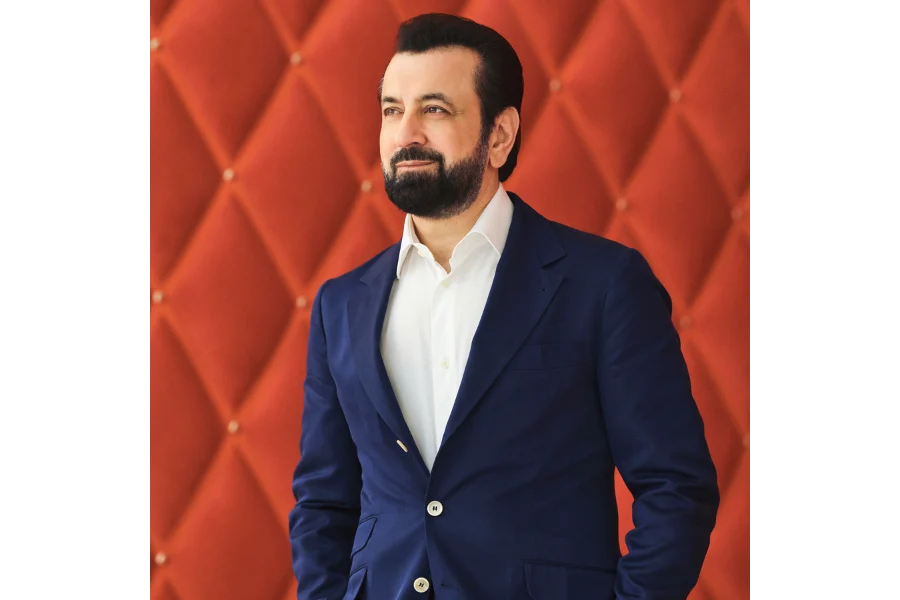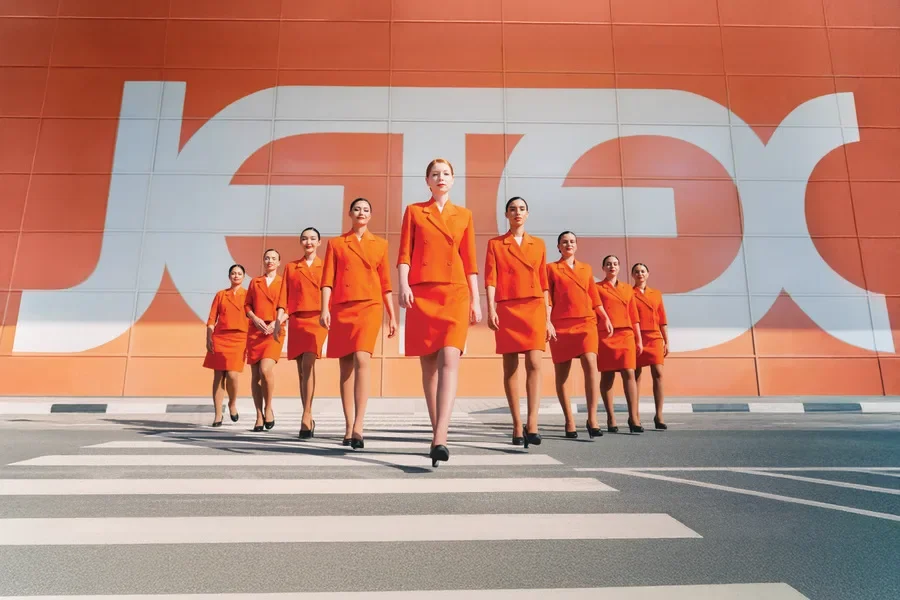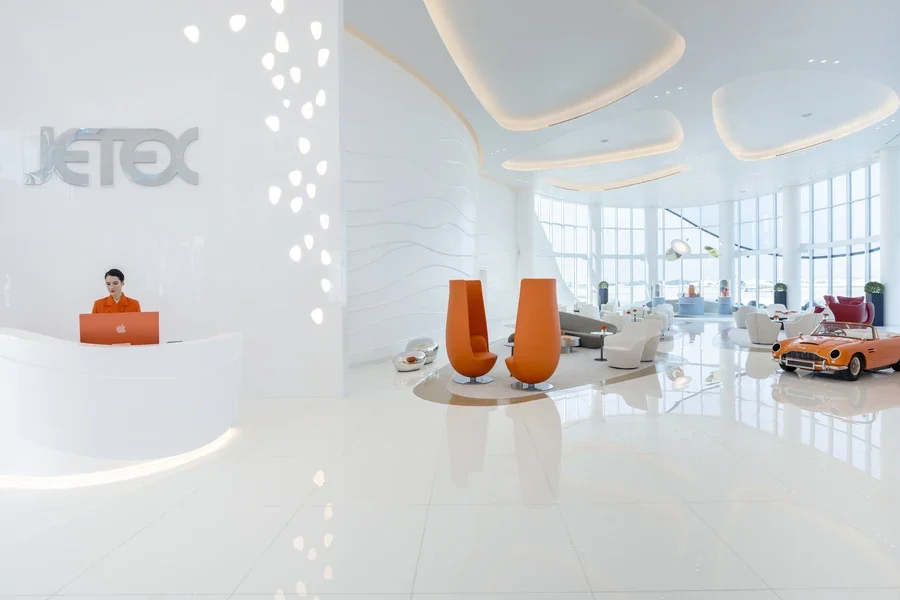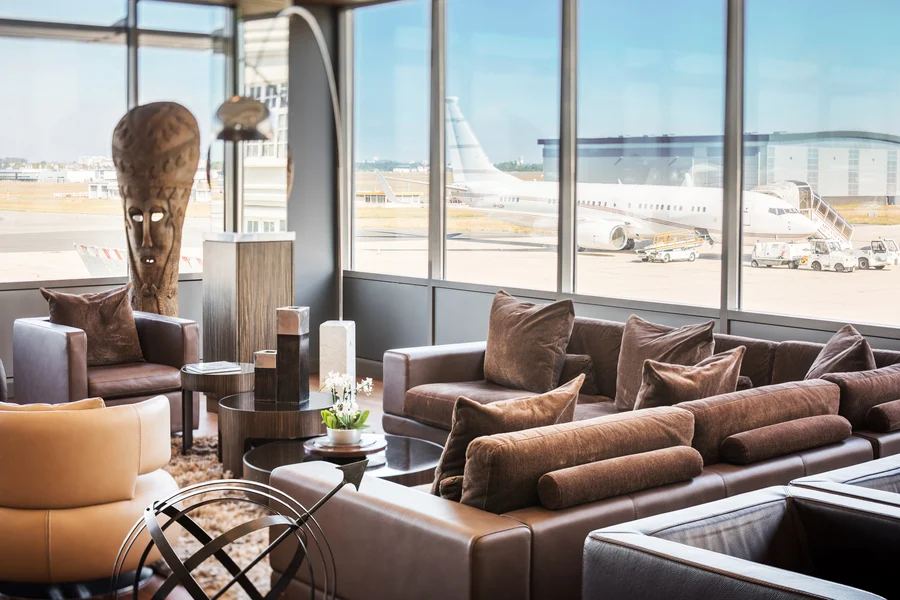JETEX HAS BEEN AT THE FOREFRONT OF COMBINING LUXURY HOSPITALITY WITH PRIVATE AVIATION. WHAT DO YOU SEE AS THE NEXT MAJOR DISRUPTION IN THE BUSINESS AVIATION SECTOR, AND HOW IS JETEX POSITIONING ITSELF TO LEAD THAT CHANGE RATHER THAN SIMPLY REACT TO IT?
JETEX is more than a private aviation company; we are a lifestyle brand. Our mission is to transform private aviation from a purely functional service into a luxury lifestyle experience. Today, everything revolves around the customer journey. For us, a client is no longer just a passenger but a guest. We want to ensure that their experience begins long before they board the aircraft, starting at the terminal itself. That’s how we see JETEX: a high- end, luxury lifestyle brand setting new standards in the industry.
JETEX HAS A VAST GLOBAL FOOTPRINT. HOW DO YOU APPROACH THE DECISION TO ENTER A NEW MARKET? WHAT ARE THE KEY DIFFERENTIATORS BETWEEN MATURE MARKETS LIKE EUROPE AND EMERGING MARKETS SUCH AS ASIA AND LATIN AMERICA?
In aviation, the real opportunities lie in emerging markets. Mature regions like Europe are stable, established, and well-served, while growth potential is much greater in Asia, Africa, and the Balkans. After COVID-19, there was a major shift in the customer base: before, the primary travelers were governments and oil companies. Today, demand also comes from sectors like fashion and technology. Much of this new demand originates from emerging markets, and that is where JETEX sees the biggest opportunities for growth.
YOU’VE OFTEN SPOKEN ABOUT YOUR JOURNEY FROM A HUMBLE BACKGROUND TO FOUNDING JETEX. WHAT IS THE MOST SIGNIFICANT LEADERSHIP LESSON YOU LEARNED DURING THAT TIME, AND HOW DO YOU INSTILL THAT ENTREPRENEURIAL SPIRIT IN YOUR TEAM TODAY?
Two lessons stand out: passion and speed. I began my career driving passengers and crew from the terminal to the aircraft, so I know every aspect of this business from the ground up. Passion has always been my driver. The second lesson is to be fast in making decisions. I don’t believe in rigid plans; opportunities often arise unexpectedly, and you must be ready to seize them. Having clear targets is important, but flexibility is what allows us to grow.
YOU’RE KNOWN FOR YOUR “NOTHING IS IMPOSSIBLE” MOTTO AND YOUR COMMITMENT TO CORPORATE SOCIAL RESPONSIBILITY. HOW DO YOU INTEGRATE THESE PERSONAL VALUES INTO THE CORE BUSINESS PHILOSOPHY OF JETEX, AND WHAT IS THE BUSINESS CASE FOR DOING SO?
At JETEX, we always aim to create something new. For example, when you enter our terminals, you feel like you’re stepping into a luxury hotel lobby, not an airport. That’s the kind of experience we want to deliver. Our partnerships also reflect this philosophy. We recently partnered with Archer to bring eVTOL to market, and we signed an agreement with Les Roches Hospitality Business School in Switzerland to train the next generation of aviation professionals. For us, CSR is not just about giving back, it’s about investing in people and communities. We began in Abu Dhabi and will expand this program to Spain and Switzerland. When we recruit, passion is what we look for first. Skills can be trained, but passion cannot be taught.
SUSTAINABILITY IS A GROWING CONCERN IN THE AVIATION INDUSTRY. WHAT IS JETEX’S LONG-TERM STRATEGY FOR PROMOTING SUSTAINABLE AVIATION FUEL (SAF) AND OTHER GREEN TECHNOLOGIES, AND WHAT ROLE DO YOU SEE PRIVATE AVIATION PLAYING IN THE BROADER CLIMATE CHANGE CONVERSATION?
JETEX was the first to introduce SAF during COP28 and at the Dubai Airshow two years ago. We’ll continue to provide SAF for our clients, including at the upcoming Dubai Airshow. The challenge is not demand. clients, especially governments and corporates, are eager to use SAF. it’s actually availability and cost, which is currently five to ten times higher than traditional fuel. Our vision is to convert all our ground equipment worldwide to green, electric alternatives, and we’re working with partners to make SAF more accessible globally.
JETEX PRIDES ITSELF ON A SEAMLESS, FIVE-STAR EXPERIENCE. HOW ARE YOU LEVERAGING CUTTING-EDGE TECHNOLOGIES LIKE AI AND DATA ANALYTICS TO FURTHER PERSONALIZE SERVICES FOR YOUR DISCERNING CLIENTELE WITHOUT LOSING THE HUMAN TOUCH?
This is our biggest challenge. AI will transform many industries and eliminate thousands of jobs, but I don’t believe it can replace human interaction in hospitality. Technology can streamline administrative processes and enhance efficiency, but when it comes to the guest experience, the smile, conversation, and personal care cannot be replicated by a machine. At JETEX, we use AI for backend services, but the human touch will always remain central to what we do.
WITH RAPID EXPANSION AND A DIVERSE GLOBAL TEAM, HOW DO YOU ENSURE THE CONSISTENT DELIVERY OF A PREMIUM, UNIFIED SERVICE EXPERIENCE ACROSS ALL JETEX LOCATIONS, FROM DUBAI TO MIAMI? WHAT IS YOUR APPROACH TO QUALITY CONTROL AND OPERATIONAL STANDARDS?
Consistency is key to our brand. We conduct regular site visits and audits, but we also rely heavily on customer feedback, as many of our clients use multiple JETEX locations worldwide. We’ve built a strong framework of standard operating procedures, and our teams are trained to uphold these standards. Our people are passionate professionals who understand what it means to represent JETEX, and we ensure they have the guidance and tools to deliver a uniform, five-star experience everywhere.
THE PRIVATE AVIATION INDUSTRY SAW SIGNIFICANT GROWTH DURING THE PANDEMIC. WHAT ARE THE BIGGEST RISKS AND CHALLENGES JETEX FACES TODAY, AND WHAT MEASURES ARE YOU TAKING TO ENSURE THE COMPANY REMAINS RESILIENT AND CONTINUES ITS GROWTH TRAJECTORY?
Demand has grown exponentially. In Dubai, for example, we handled around 4,000 flights in 2019. Today, that number has tripled to more than 12,000. Our biggest challenge is capacity – securing slots at airports and keeping up with demand. For our clientele, time is the most valuable asset. Every flight hour costs tens of thousands of dollars, so efficiency is critical. Across the GCC, massive investments are being made in new airports and infrastructure, particularly in Saudi Arabia, Qatar, Kuwait, Oman, and Bahrain. This region is now at the forefront of aviation growth, supported by visionary leadership, stability, and long-term investment. Europe, by contrast, has not seen new airport infrastructure for decades. That is why we see the GCC as the epicenter of future aviation growth, and JETEX is positioning itself to play a leading role in this transformation.




























